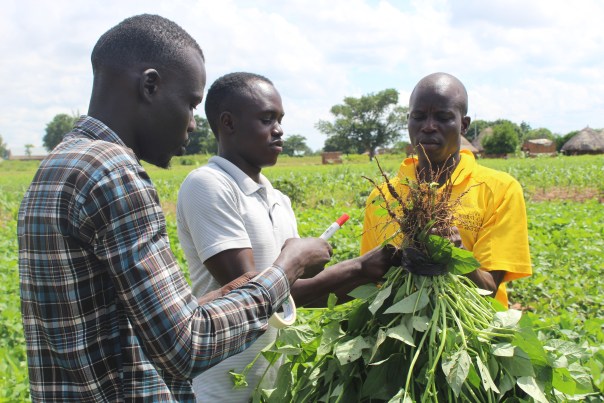
(SECOND OF FOUR-PART SERIES: This is the second of four stories about a five-year-old, American-led writing and research workshop at Uganda Christian University. The first article contained reflections of the Ohio woman who founded and leads the training. This second article reflects thoughts of an American volunteer in 2017 and 2019. The final two articles feature UCU graduates who helped with the workshop. Parts I, III and IV can be accessed at those links. A video is here.)
By Linda Knicely
“It’s not enough to be busy. So are the ants. The question is: what are we busy about?” So said American essayist and philosopher, Henry David Thoreau.
Ugandans are busy. During the four weeks that I and three other American lecturers spent on the Uganda Christian University (UCU) campuses in four different locations, presenting to graduate students and faculty members during the dissertation clinic and trainings and individually coaching the students in 2019, this was apparent.
Sometimes they’re busy earning a living, taking care of children, and handling other tasks needed to survive. Other times, they’re busy relaxing and enjoying fellowship with one another. On campus, they’re learning. Both formally from their instructors and peers in the classroom sand informally during pick-up basketball games, at the canteens or as they walk and talk with each other. They’re learning how to grow into young adults of integrity, guided by Christian principles in the nurturing environment of UCU.
They’re also teaching.

They teach by example – the genuine and warm “You are welcome” that greets us at every turn brings smiles to our faces and is not as common in other parts of the world as one might think (or wish). They teach by sharing their stories with us and sometimes their language and their culture. They teach by risking vulnerability as they reveal their fears, their hopes and their dreams for themselves, their families, and their country of Uganda.
Americans are busy. Sometimes we’re coping with what, as I explained to one of my UCU students, David, we call “first world problems.” Very minor issues, in the scheme of things. We work hard, both on the job and even at play. We can find it hard to relax and just “be.” Sometimes, unfortunately, we consider ourselves more often as “teachers” for the rest of the world, than learners. What a loss, for those that have that perspective, for there is so much to learn in Uganda.
I’ve been busy. When I first came to Uganda for six weeks two years ago (2017), I had no plans of making a return trip. It wasn’t a personal judgment about Uganda, but more about my craving to explore and experience as many different places in the world as possible.But because of what I learned that year from the people of Uganda, mostly in the UCU graduate school program, and the piece of my heart that I left here, I surprised myself by deciding to return.
In very typical American fashion, as our students (and interns) in 2019 have learned, we (our American team here) like to “keep time” and schedule ourselves tightly in order to be as productive as possible. I came back to teach, of course, and to support the graduate students with whom I interacted, to successful completion and defense of their dissertations.
But I also came back to learn more, and to re-imprint the lessons of two years ago on my memory and in my heart. My time spent here at UCU during this visit has felt even busier. Self-reflection will be a process that may wait until I return to the USA and my life there. But I hope that some of the lessons that I learn in Uganda prompt me to always question: “What am I busy about?”
And then there’s Patty Huston-Holm, the queen of “busy.” Patty was in Uganda for her eleventh visit in 2019 with many of the visits lasting months at a time; she led the student and faculty dissertation training for the fifth consecutive year on behalf of UCU Partners and the UCU School of Research and Post-Graduate Studies. While we (me, Tracy and David Harrison) were along this year, other years she has “flown solo.”Patty is never satisfied with what’s she’s done before, but constantly strives to improve the presentations or extend the program’s reach.
This year, she added coaching sessions at the UCU Kampala campus and faculty and student presentations on both Kabale and Mbale campuses. And the work that we’re directly involved with only represents one of the many roles that Patty has personally embraced in her support of Uganda Christian University’s mission.
I think that even those staff who know her on campus would be surprised at the time that she invests when she is home – continuing to arrange logistics and remain in communication to plan next steps, etc. She commits her tremendous talents and experience to this work out of Christian love for her Ugandan brothers and sisters, both those she knows already and those who will be impacted in the future through the vision and efforts of today’s students and staff at the university.
Patty’s clear sense of what she should “be busy about,” inspires me, and many others whose lives she has touched.
Two years ago, during one of our first conversations about Uganda, she told me that she believed in “investing in people.” I can’t think of a better way to be busy.
++++
Ohioan Linda Knicely volunteered with Patty Huston-Holm in 2017 and 2019. To learn more about how to become part of this literacy work at UCU, email Patty at hustonpat@gmail.com. For more information about UCU Partners and how to contribute financially to students, programs and facilities at UCU , contact Mark Bartels, UCU Partners executive director, at m.t.bartels@ugandapartners.org.
Also follow and like our Facebook, Instagram and LinkedIn pages.
+++++



















































You must be logged in to post a comment.